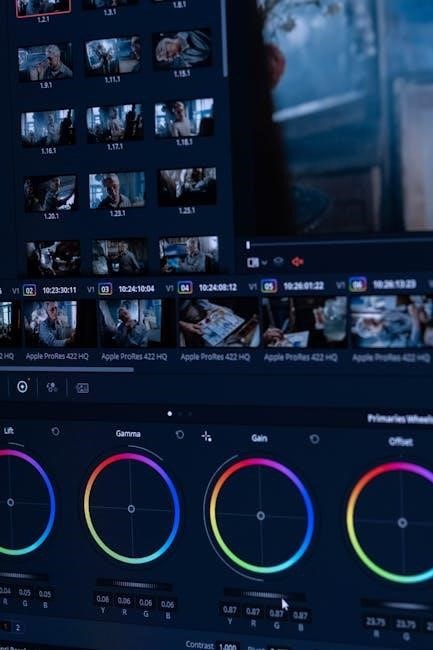Language Files 12th Edition PDF: A Comprehensive Overview
Language Files, the 12th edition, is a widely used resource for introductory linguistics, now available for purchase from the Ohio State University Press as a PDF.
Availability and Download Options

, offers several avenues for access. While direct downloads of the complete PDF may require purchase through the Ohio State University Press, various online platforms facilitate access to the materials.
Users can explore options for obtaining the ePAPER version or searching for downloadable resources shared by academic communities. It’s important to note that sharing copyrighted material without authorization is prohibited.
Furthermore, the 13th edition’s availability may influence access to the 12th; however, the 12th edition remains a valuable resource. Checking university libraries and online bookstores is recommended for legitimate download options.
Ohio State University Press Publication
Language Files, 12th Edition, is proudly published by the Ohio State University Press, a renowned academic publisher. This affiliation signifies a commitment to scholarly rigor and quality in linguistic resources. The Press ensures the book meets high standards for content and presentation, making it a trusted choice for educators and students alike.
The publication by OSU Press guarantees accessibility within academic networks and libraries. Purchasing directly from the Press supports continued research and publication in the field of linguistics.

Congratulations were extended to the editors, Hope Dawson and Mike Phelan, upon the 12th edition’s release, highlighting the Press’s role in disseminating valuable linguistic knowledge.
Key Features of the 12th Edition
The 12th edition of Language Files boasts significant revisions and clarifications, enhancing its pedagogical effectiveness. It comprehensively covers core areas like phonetics, syntax, semantics, and language acquisition. The text explores linguistic variation and provides ample exercises for practical application.
A key feature is the inclusion of detailed data for analysis, such as the Isthmus Zapotec examples in File 4.5, offering hands-on experience with morphological analysis. The PDF format allows for easy access and integration into digital learning environments.
This edition aims to be a user-friendly and thorough introduction to the fascinating world of language and linguistics.
Language Files serves as a foundational text for students beginning their journey into the study of language and linguistics. The 12th edition PDF meticulously introduces core concepts, providing a broad overview of the field. It explores the systematic nature of human language, examining its structure, meaning, and use in diverse contexts.
The material covers a wide spectrum, from the physical production of speech sounds to the complexities of sentence construction and the cognitive processes involved in language comprehension. It’s designed to equip learners with the tools to analyze and understand language scientifically.

This edition fosters critical thinking about language’s role in culture and society.
Core Linguistic Concepts Covered
Language Files, in its 12th edition PDF format, comprehensively covers phonetics, syntax, semantics, and language acquisition, offering a robust linguistic foundation.
Phonetics and Phonology
Language Files’ 12th edition PDF dedicates significant attention to the foundational areas of phonetics and phonology. Students will explore articulatory phonetics, examining how speech sounds are produced, and acoustic phonetics, analyzing their physical properties.
The text delves into the International Phonetic Alphabet (IPA), equipping learners with the tools to transcribe sounds accurately. Furthermore, it investigates phonology, focusing on how sounds function within a language system – including phonemes, allophones, and processes like assimilation and deletion.
Exercises within the PDF allow for practical application of these concepts, fostering a deeper understanding of sound systems across diverse languages. This section provides a solid base for further linguistic study.
Syntax and Sentence Structure
The Language Files 12th edition PDF provides a thorough exploration of syntax, the study of sentence structure. It introduces core concepts like phrase structure rules, tree diagrams, and grammatical relations – subject, object, and adjuncts.
Students will learn to analyze sentences, identifying constituent parts and understanding how they combine to create meaning. The material covers different syntactic categories, including nouns, verbs, adjectives, and adverbs, and their roles in sentence formation.
The PDF also examines various sentence types, such as declarative, interrogative, and imperative, and explores syntactic processes like transformations and movement. Practical exercises reinforce these concepts, enabling students to dissect and comprehend complex sentence structures.
Semantics and Meaning

The Language Files 12th edition PDF delves into semantics, the study of meaning in language. It explores lexical semantics, examining word meanings and relationships like synonymy, antonymy, and hyponymy. Students will learn about compositional semantics, understanding how the meanings of words combine to form the meaning of phrases and sentences.
The material covers semantic roles, such as agent, patient, and instrument, and how they contribute to our understanding of events. It also introduces concepts like ambiguity, entailment, and presupposition, crucial for interpreting language accurately.
Exercises within the PDF allow students to analyze meaning in context, identify semantic anomalies, and explore the relationship between language and thought.
Language Acquisition
The Language Files 12th edition PDF provides a comprehensive overview of how humans acquire language. It examines key theories, including behaviorist, nativist, and interactionist approaches, exploring the roles of imitation, innate abilities, and social interaction in the language learning process.
The material details stages of first language acquisition, from babbling and one-word utterances to telegraphic speech and the development of grammatical morphemes. It also investigates second language acquisition, considering factors like age, motivation, and learning strategies.
The PDF includes discussions on critical periods and the influence of input on language development, offering insights into the complexities of becoming fluent.
Specific Content Examples
Language Files 12th edition PDF features File 4.5, offering morphological analysis exercises, and includes detailed data analysis of Isthmus Zapotec, a fascinating language.
Morphological Analysis Exercises (File 4.5)
Language Files’ File 4.5 provides beginning-level exercises specifically designed to build foundational skills in morphological analysis. These exercises are a core component of the 12th edition PDF, offering students practical application of linguistic concepts. The file focuses on breaking down words into their constituent morphemes – the smallest units of meaning.
A key example within File 4.5 involves detailed examination of data from Isthmus Zapotec, a language spoken in Mexico. Students analyze Zapotec words, identifying prefixes, suffixes, and roots to understand how meaning is constructed. This hands-on approach reinforces theoretical understanding and develops analytical abilities crucial for further linguistic study. The exercises are structured to progressively increase in complexity, guiding learners through the process of morphological decomposition.
Isthmus Zapotec Data Analysis
The 12th edition of Language Files utilizes data from Isthmus Zapotec as a compelling case study for linguistic analysis, particularly within morphological exercises like those found in File 4.5. This language, spoken in Oaxaca, Mexico, presents unique features that illuminate core linguistic principles. Students analyze Zapotec words, identifying patterns in affixation and root structure.
The PDF version of the text provides specific Zapotec data sets, allowing learners to apply morphological rules and discover how meaning is encoded. This practical application enhances understanding of concepts like allomorphy and polysynthesis. Analyzing Isthmus Zapotec offers a valuable opportunity to explore linguistic diversity and challenge assumptions based solely on more familiar languages.
Technical Details & Identification
Language Files, 12th edition, is identified by ISBN: 978-0814252703 and ASIN: 0814252702, published by the Ohio State University Press as a PDF.
ISBN: 978-0814252703
The ISBN, 978-0814252703, serves as a unique commercial book identifier for the 12th edition of Language Files. This number is crucial for tracking and ordering the textbook, whether in physical form or as a PDF download.
It distinguishes this specific edition from previous and subsequent versions, including the 13th edition. The Ohio State University Press utilizes this ISBN for cataloging and distribution purposes.
Students and researchers can use this ISBN when searching for the book at online retailers or through university library systems; Accurate identification via the ISBN ensures the correct version of Language Files is obtained, facilitating study of linguistics and language analysis.
ASIN: 0814252702
The ASIN, 0814252702, represents the Amazon Standard Identification Number assigned to the 12th edition of Language Files. This identifier is specifically used within the Amazon marketplace for product listing and tracking.
It allows customers to easily locate and purchase the textbook, including potential PDF versions offered through third-party sellers on the platform.
While the ISBN is more universally recognized, the ASIN is vital for Amazon-based searches and ordering. Both numbers – ISBN and ASIN – ensure accurate identification of this particular edition of Language Files, aiding students and researchers in accessing essential linguistic materials.

File Formats and Accessibility

Language Files 12th edition is primarily available in PDF format, offering convenient online reading and potential download options for students.
PDF Format Availability

The Language Files 12th edition is readily accessible as a PDF document, making it a convenient resource for students and researchers alike. This digital format allows for easy distribution and access across various devices, including computers, tablets, and smartphones.
While direct download links aren’t universally provided, the PDF version is obtainable through the Ohio State University Press and potentially through academic institutions. The PDF format ensures the preservation of the original formatting and content, crucial for linguistic examples and exercises.
Users can expect a comprehensive digital experience, mirroring the printed edition, with all exercises, data sets, and analytical materials included. The availability of the PDF facilitates both online reading and offline study, enhancing its usability.
Online Reading Options
Although dedicated online reading platforms specifically for the Language Files 12th edition PDF aren’t prominently featured, several avenues enable digital engagement with the material. Accessing the PDF through the Ohio State University Press website allows for online viewing within a web browser.
Furthermore, the PDF can be uploaded to popular document cloud services like Google Drive or Dropbox, facilitating reading on various devices and enabling collaborative study. Some academic libraries may also offer access to the PDF through their digital resource portals.
These options provide flexibility for students and researchers, allowing them to study linguistic concepts and exercises remotely and conveniently, without needing a physical copy of the textbook.
Related Editions and Updates
The Language Files series has a 13th edition, offering significant revisions and clarifications, building upon the foundational concepts presented in the 12th edition.
Comparison to 13th Edition
The 13th edition of Language Files represents a substantial update to the already comprehensive 12th edition. While the 12th edition served as a cornerstone for introductory linguistics courses, the newer version boasts significant revisions and clarifications throughout its content. These enhancements aim to improve accessibility and understanding for students navigating complex linguistic concepts.
Specifically, the 13th edition incorporates updated data, refined explanations, and expanded exercises. It builds upon the strong foundation laid by the 12th edition, offering a more current and engaging learning experience. Users familiar with the 12th edition will find the core structure recognizable, but appreciate the added depth and clarity of the latest release. Both editions, however, remain valuable resources for exploring the fascinating world of language and linguistics.
Target Audience
Language Files is ideally suited for students beginning their linguistics journey and researchers needing a solid foundation in language studies.
Students of Linguistics

Language Files serves as an excellent primary text for undergraduate courses introducing the core concepts of language and linguistics. The 12th edition’s comprehensive coverage, spanning phonetics to syntax and semantics, provides a robust learning experience.
Exercises, like those in File 4.5 focusing on morphological analysis – including Isthmus Zapotec data – actively engage students. The PDF format allows for convenient access and study. It’s designed to build a strong theoretical understanding, preparing students for advanced coursework and research. The clarity and revisions in this edition specifically address student needs, making complex topics more accessible.
Furthermore, the book’s structure facilitates a systematic exploration of linguistic principles, fostering critical thinking and analytical skills essential for aspiring linguists.
Researchers in Language Studies
Language Files, 12th edition, provides a valuable resource for researchers needing a readily accessible overview of fundamental linguistic concepts. The PDF format enables quick referencing of key theories and analytical frameworks.
The detailed examples, such as the Isthmus Zapotec data in File 4.5, offer practical case studies for comparative analysis. Researchers can utilize the book’s comprehensive coverage of phonetics, syntax, and semantics as a foundation for more specialized investigations. The clarity of the revised edition aids in efficient knowledge retrieval.
Its systematic approach to linguistic principles supports the development of research hypotheses and the evaluation of existing literature within the field.
Authors and Editors
Language Files, 12th edition, benefits from the expertise of Hope Dawson and Mike Phelan, who served as the dedicated editors of this edition.
Hope Dawson
Hope Dawson is recognized as a key figure in the development and refinement of Language Files, specifically contributing significantly to the 12th edition. As one of the editors, she played a crucial role in overseeing revisions, ensuring clarity, and updating the materials for contemporary linguistics students.
Her dedication to the project involved meticulous attention to detail, collaborating with other experts, and maintaining the book’s reputation as a comprehensive introduction to the field. Dawson’s work helped to solidify Language Files’ position as a standard textbook in numerous university courses. The Ohio State University Press acknowledges her contributions.

Dawson’s editorial oversight ensured the 12th edition remained accessible and engaging for learners beginning their linguistic journey, making complex concepts understandable.
Mike Phelan
Mike Phelan is a highly respected linguist and co-editor of Language Files, 12th edition. Alongside Hope Dawson, he was instrumental in the substantial revisions and clarifications implemented in this edition, making it a valuable resource for students and researchers alike.
Phelan’s expertise contributed to the book’s continued success as a leading introductory text. His work with the Ohio State University Press ensured the 12th edition maintained its high standards of academic rigor and pedagogical effectiveness. He focused on updating content to reflect current linguistic thought.
Phelan’s dedication helped shape Language Files into a comprehensive and accessible guide to the fascinating world of language and linguistics.

























































































